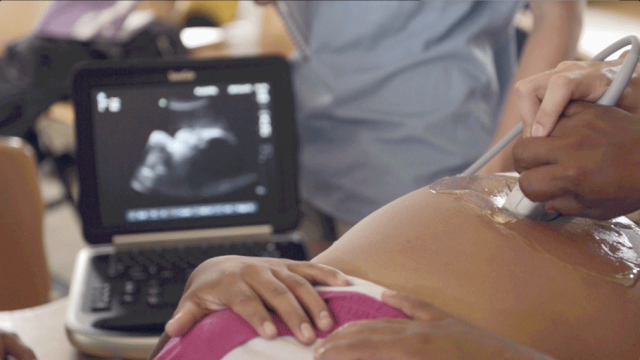
by Dr. Ben LaBrot, founder of Floating Doctors
As of this writing, my wife is pregnant with our first child, and the novelty has long since worn off. After looking after so many other people’s pregnancies, it’s a novel experience to be on the other end of the ultrasound probe, as it were.
Complicated pregnancies are more than the miracle of creating new life—they can be a long, stressful waiting game fraught with nasty surprises, difficult challenges and uncertainty… as I now understand better than I would like.
My wife and I regularly attend ultrasound appointments to check on the health of our baby. Each time, as the probe is being unlimbered, my heart races a little faster and we brace ourselves for possible bad news. My wife and I sometimes talk about what a chore it is; ‘having’ to get ultrasounds so often—even though each time, it is a huge relief to know that for the moment, everything is OK.
The other day, we remembered a patient of ours from about 5 years ago. She was an indigenous Ngäbe woman, 5 months pregnant, and had tumbled head-over-heels down a muddy hillside in front of her horrified husband. That night, she had some light spotting and pain in her abdomen (and the rest of her body), and felt like the baby wasn’t moving. The fear took hold right away and grew throughout the night and following day.
They lived in a small rural village in the jungle, 30 miles by boat from the nearest town with electricity. We happened to be in the area, and they paddled to us for help. At that time, we had our little Sonosite 180—already a veteran of our time Haiti and Honduras—and we found a private space to scan the mother.
I was recently rewatching video footage of this event. I immediately recognized the tense expressions on the faces of the mom and dad—it’s the same one I have on my own face as the OB/GYN shifts the probe around my wife’s abdomen to make sure everything is OK with our baby.
I also recognized the sense of relief that washed over this young couple when I was able to tell them that their baby was just fine. It’s a feeling that I now empathize with so much more.
I’ll never forget the young father’s head falling onto his wife’s shoulder in abject relief, or the tense fear on their faces, and the change that came over them when they learned their baby was alive and well.
This is what ultrasound can mean—both to me and my wife (who are fortunate enough to be giving birth in one of the most advanced and resource-rich locations in the world) and to that Ngäbe couple who paddled on a boat to get confirmation of their baby’s heartbeat.
Remembering that couple gave me some much-needed perspective on the ‘chore’ of driving through paved streets in an air-conditioned vehicle to an ultrasound appointment. It reminded me that I have access to ultrasound technology whenever it is needed, not through blind luck.
Who would have thought that ultrasound would create a connection of such shared human experience between us and another young couple, across so many years?
Dr. Ben LaBrot and his organization, Floating Doctors, treat thousands of patients in isolated areas of Central America and Haiti.
Learn More About How Teams Like Floating Doctors Use POCUS
Lighthouse Medical Missions has been sending doctors and nurses to Africa since 1998, with medical teams on the ground after the Blood Diamond wars in Sierra Leone and after the Ebola outbreak as well. In this video Dr. Russ Engevik discusses how his team uses the Sonosite iViz for portable, remote point-of-care applications.

